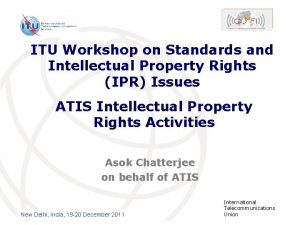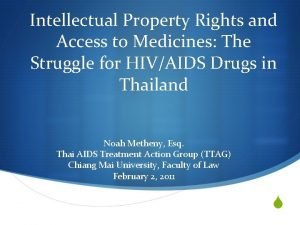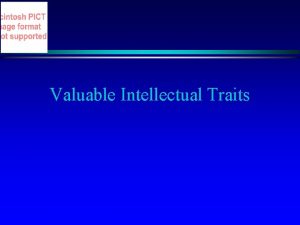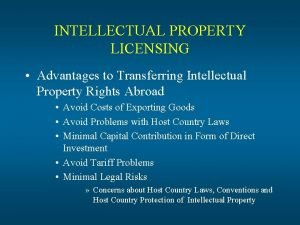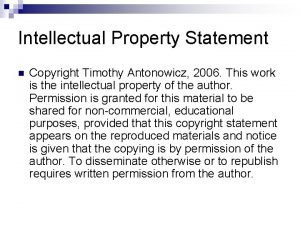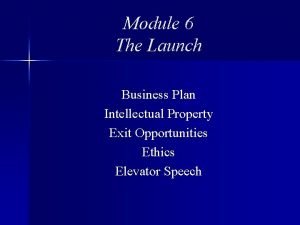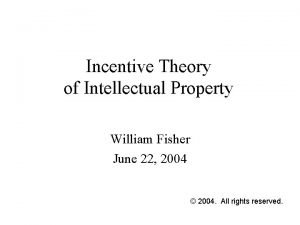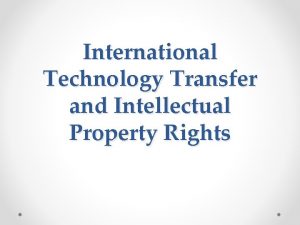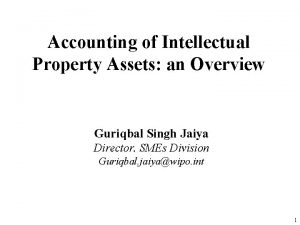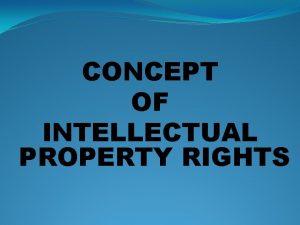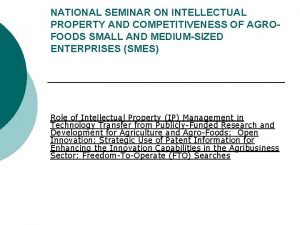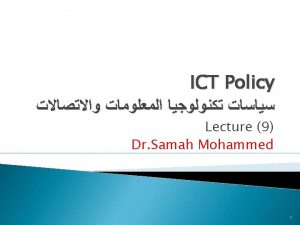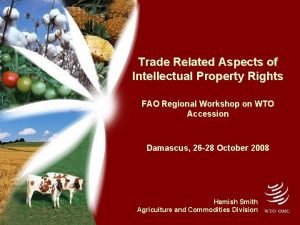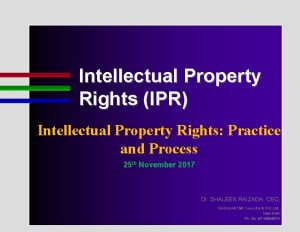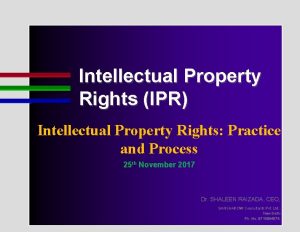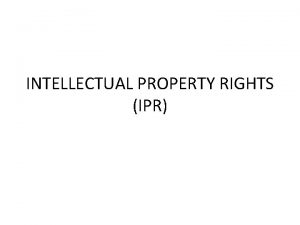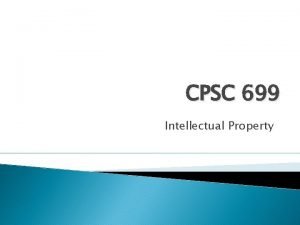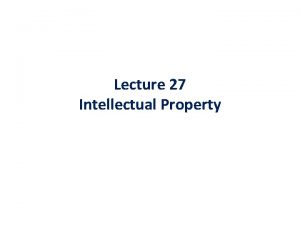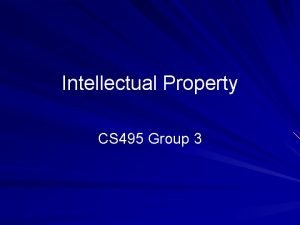TRADE RELATED ASPECTS OF INTELLECTUAL PROPERTY RIGHTS ASST

























- Slides: 25

TRADE RELATED ASPECTS OF INTELLECTUAL PROPERTY RIGHTS ASST. PROF. EISHA VASHISHTHA

TRIPS

TRIPS-INTRODUCTION • Trade Related Aspects of Intellectual Property Rights (TRIPS) came into force from 1 ST January 1995. • It lays down minimum standards for protection and enforcement of intellectual property rights in member countries which are required to promote effective and adequate protection of intellectual property rights with a view to reducing distortions and impediments to international trade. The obligations under the TRIPS Agreement relate to provision of minimum standard of protection within the member countries legal systems and practices.

AREAS COVERED qcopyright and related rights (i. e. the rights of performers, producers of sound recordings and broadcasting organizations) qtrademarks including service marks qgeographical indications including appellations of origin qindustrial designs qpatents including the protection of new varieties of plants qthe layout-designs of integrated circuits qundisclosed information including trade secrets qtest data

HISTORY q. The foundations for the Uruguay Round were laid by a ministerial meeting in Geneva in November 1982, where contracting parties agreed to a new negotiation round to begin in September 1986 in Punta del Este, Uruguay. q. Government ministers assembled in Uruguay adopted an agenda covering every outstanding trade-related policy issue. Within the framework of these negotiations there was a request from the United States of America to include a multilateral agreement on minimum standards for intellectual property rights.

HISTORY contd. q. The multilateral trade negotiations took very long and it was only on 15 th December 1993 that all aspects of the negotiations were finally resolved. q. The "Final Act Embodying the Results of the Uruguay Round on Multilateral Trade Negotiations" was signed at Marrakesh, Morocco on 15 th April 1994. By signing this Final Act, countries agreed to submit the "Marrakesh Agreement establishing the World Trade Organization" (called also "World Trade Organization Agreement" or "WTO Agreement") for the consideration of their competent national authorities with a view to seeking their approval. q. As one of the Agreements for which the WTO Agreement is an umbrella, the TRIPS Agreement entered into force on 1 st January 1995.

MAIN FEATURES OF THE AGREEMENT STANDARDS- SETS OUT THE MINIMUM STANDARDS OF PROTECTION TO BE PROVIDED BY EACH MEMBER Each of the main elements of protection is defined: q. Subject-matter to be protected q. Rights to be conferred q. Permissible exceptions to those rights q. Minimum duration of protection The Agreement sets these standards by requiring: q. The substantive obligations of the main conventions of the WIPO, Paris Convention and the Berne Convention must be complied with. With the exception of the provisions of the Berne Convention on moral rights. (Articles 2. 1 and 9. 1 of the TRIPS Agreement) q. TRIPS Agreement adds a substantial number of additional obligations on matters where the pre-existing conventions are silent or were seen as being inadequate.

ENFORCEMENT: DOMESTIC PROCEDURES AND REMEDIES FOR THE ENFORCEMENT OF INTELLECTUAL PROPERTY RIGHTS The Agreement lays down certain general principles applicable to all IPR enforcement procedures. In addition, it contains provisions on civil and administrative procedures and remedies, provisional measures, special requirements related to border measures and criminal procedures, which specify, in a certain amount of detail, the procedures and remedies that must be available so that right holders can effectively enforce their rights.

DISPUTE SETTLEMENT The TRIPS Agreement makes disputes about the respect of the obligations under the Agreement subject to the WTO's dispute settlement procedures (Article 64)

REQUIREMENTS OF TRIPS q. Copyright terms must extend at least 50 years, unless based on the life of the author. q. Copyright must be granted automatically, and not based upon any "formality, " such as registrations, as specified in the Berne Convention. q. Computer programs must be regarded as "literary works" under copyright law and receive the same terms of protection. q. National exceptions to copyright (such as "fair use" in the United States) are constrained by the Berne three-step test.

REQUIREMENTS OF TRIPS contd. q. Patents must be granted for "inventions" in all "fields of technology" provided they meet all other patentability requirements (except for those of public interests are allowed) and must be enforceable for at least 20 years. q. No unreasonable prejudice to the legitimate interests of the right holders of computer programs and patents is allowed. q. Legitimate interests of third parties have to be taken into account by patent rights q. Intellectual property laws may not offer any benefits to local citizens which are not available to citizens of other TRIPS signatories under the principle of national treatment q. Software and databases are protected by copyright, subject to originality requirement (Art 10).

PROVISIONS FOR LEAST DEVELOPED COUNTRIES TRANSITIONAL PERIOD FOR IMPLEMENTING THE AGREEMENT DCs were not required to implement the TRIPS Agreement for a period of 10 years from 1 st January 1996 other than: q. Article 3 (national treatment) q. Article 4 (MFN treatment) q. Article 5 (precedence of WIPO procedures) q. It was extended for another 7. 5 years which expired on 1 st July 2013. q. Further extension for LDCs was granted until 1 st July 2021, or earlier, upon graduation from the LDC category.

TRANSITIONAL PERIOD FOR PHARMACEUTICAL PRODUCTS q. LDC members of the WTO are not obliged to protect pharmaceutical patents until 1 st January 2033 q. DC’s are obliged to provide the minimum standard of protection for pharmaceutical patents (20 years). q. LDCs benefit from a waiver on the obligation to provide the means for filing patents and provide patent protection and exclusive marketing rights.

WAIVER FROM NOTIFICATION REQUIREMENTS FOR ISSUING COMPULSORY LICENSES FOR EXPORTS OF PHARMACEUTICAL PRODUCTS TO LDC’S q. A waiver to article 31(f) which allows producers to export drugs produced under compulsory licensing to countries without manufacturing capacity. q. The Decision however requires that the importing country demonstrate lack of manufacturing, except in the case of the least developed countries.

TECHNOLOGY TRANSFER Developed country Members shall provide incentives to enterprises and institutions in their territories for the purpose of promoting and encouraging technology transfer to least-developed country Members in order to enable them to create a sound and viable technological base.

FLEXIBILITIES UNDER THE TRIPS AGREEMENT q. The TRIPS established minimum standards of protection that each government has to give to the IP of fellow WTO members, thus limiting the former scope for flexible national approaches. q. However, the TRIPS Agreement incorporates certain "flexibilities. " These aim to permit developing and least-developed countries to use TRIPS-compatible norms in a manner that enables them to pursue their own public policies, either in specific fields like access to pharmaceutical products or protection of their biodiversity, or more generally, in establishing macroeconomic, institutional conditions that support economic development.

FLEXIBILITIES AS TO THE METHOD OF IMPLEMENTING TRIPS OBLIGATIONS A WTO Members can exploit creative solutions to transpose into national law and practice those concepts that the TRIPS Agreement simply enunciates but does not define. Examples of those flexibilities include concepts such as novelty and inventiveness; or of situations of extreme urgency for the purposes of compulsory licenses.

FLEXIBILITIES AS TO SUBSTANTIVE STANDARDS OF PROTECTION These flexibilities can operate either downward or upward, i. e. they may permit measures that reduce or limit the rights conferred; or measures that raise the level of protection above the minimum standards established by the TRIPS Agreement.

FLEXIBILITIES AS TO MECHANISMS OF ENFORCEMENT In the field of enforcement, the TRIPS Agreement (in Part III): qidentifies the mechanisms that Members are obliged to adopt in order to make enforcement rights available to IP owners; and qprohibits Members from adopting stricter measures against defendants than those that are established. Nevertheless, Members can resort to their own legal system and practices to implement enforcement obligations. WTO Members are, for example, free to maintain their own judicial system. They also can use enforcement measures to implement flexibilities as to the standards of protection.

FLEXIBILITIES AS TO AREAS NOT COVERED BY THE TRIPS AGREEMENT q. The TRIPS Agreement does not cover a number of areas of IP subject matter, either because there was no consensus at the time the Agreement was negotiated, or because the areas in question had not yet emerged, or simply because the negotiators of the TRIPS Agreement did not consider that problems of barriers to trade existed in those areas. Some of those areas are of particular interest to developing countries, such as utility models, traditional knowledge and handicrafts. q. Unlike the "upward" standards of protection mentioned above, these flexibilities lie outside the TRIPS Agreement. Therefore, countries legislating on those subjects do not need to conform to the principles and provisions of the Agreement. For example, the protection of traditional knowledge can be extended to foreigners on a basis of reciprocity only.

TRIPS WORK IN THE WTO q. The TRIPS Council administers the TRIPS Agreement. It consists of all WTO members. The Council's work on monitoring involves discussion and review of laws implementing the TRIPS Agreement. q. Transparency mechanisms, such as TRIPS notification obligations, questionnaires and exchanges of questions and replies among WTO members, help the Council monitor the operation of the Agreement. q. The Council annually reviews reports on technical cooperation and capacitybuilding activities as well as on developed countries' implementation of the obligation to provide incentives to their industries to transfer technology to least developed countries (LDCs).

TRIPS WORK IN THE WTO contd. q. In addition, it reviews the functioning of the system that permits the granting of compulsory licences for export of medicines. q. Members have to notify the TRIPS Council about their relevant laws and regulations. This helps the Council review the agreement’s operation. q. Assessment of technical cooperation.

KEY ISSUSES WITH TRIPS q. The need to avoid inappropriate patenting, such as patenting a claimed invention that is not new or does not involve an “inventive step”. q. The need to avoid what is sometimes loosely called “biopiracy” is still being debated q. Negotiations to create a multilateral geographical indication register for wines and spirits q. Discussions on extending the higher (Article 23) level of protection beyond wines and spirits.

POST-TRIPS EXPANSION In addition to the baseline intellectual property standards created by the TRIPS agreement, many nations have engaged in bilateral agreements to adopt a higher standard of protection. These collection of standards, known as TRIPS+ or TRIPS-Plus, can take many forms. General objectives of these agreements include: q. The creation of anti-circumvention laws to protect Digital Rights Management systems. This was achieved through the 1996 World Intellectual Property Organization Copyright Treaty (WIPO Treaty) and the WIPO Performances and Phonograms Treaty. q. More stringent restrictions on compulsory licenses for patents. q. More aggressive patent enforcement. This effort has been observed more broadly in proposals for WIPO and European Union rules on intellectual property enforcement. The 2001 EU Copyright Directive was to implement the 1996 WIPO Copyright Treaty. q. The campaign for the creation of a WIPO Broadcasting Treaty that would give broadcasters (and possibly webcasters) exclusive rights over the copies of works they have distributed.

THE END
 Trade related aspects of intellectual property rights
Trade related aspects of intellectual property rights Intellectual property in professional practices
Intellectual property in professional practices Intellectual property rights
Intellectual property rights Intellectual property rights
Intellectual property rights Intellectual and conscious aspects
Intellectual and conscious aspects Characteristics of intellectual property
Characteristics of intellectual property Valuation of ip
Valuation of ip Licensing advantages
Licensing advantages Intellectual property statement
Intellectual property statement Industrial property definition
Industrial property definition At&t ecommerce
At&t ecommerce Discuss intellectual property frankly
Discuss intellectual property frankly Example of intellectual property in business plan
Example of intellectual property in business plan Intellectual property business plan example
Intellectual property business plan example Incentive theory
Incentive theory Importance of intellectual property
Importance of intellectual property Sfas 142
Sfas 142 Property
Property Evalueserve ip
Evalueserve ip Concept of intellectual property
Concept of intellectual property Intellectual property management definition
Intellectual property management definition Intellectual property
Intellectual property Right to intellectual property of teachers
Right to intellectual property of teachers Discuss intellectual property frankly
Discuss intellectual property frankly Physical fitness is of two types
Physical fitness is of two types Skills related
Skills related


